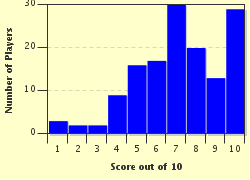Quiz Answer Key and Fun Facts
1. What German architect of the early 20th century was one of the pioneers of modern architecture and helped design/found no less than three UNESCO world heritage sites in Germany?
2. Don't let the name scare you: the Paläontologische Staatssammlung München once housed Ernst Stromer's collection of what, the first of their kind ever discovered in Egypt?
3. Hyperinflation in Germany during the early 20th century necessitated the need for and circulation of locally or privately issued "emergency money". What is it known as?
4. Through the 1920s, people like Albert Einstein, Max Planck, and Werner Heisenberg helped bring Germany to the forefront of what discipline?
5. The Wirtschaftswunder, the massive economic growth of the 1950s, could be symbolized with what car specifically intended for the common man?
6. Regarding the Beatles performing in Hamburg in the early 1960s, which of the following is FALSE?
7. For his work in European relations such as Ostpolitik, Willy Brandt was given what award?
8. Decades worth of terror attacks, as well as German Autumn, were perpetrated in Germany by what radical gang?
9. Soviet leader Leonid Brezhnev shared a passionate kiss with what East German leader of the 1970s and 1980s?
10. Germans and Germany were extremely reluctant to give up the Deutsche Mark for the Euro. Long before the actual conversion happened, what did they get for their eventual concession?
Source: Author
nautilator
This quiz was reviewed by FunTrivia editor
bloomsby before going online.
Any errors found in FunTrivia content are routinely corrected through our feedback system.

